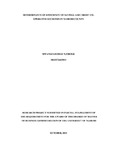| dc.description.abstract | The most important aspect of running a business is how well you are running the business. An efficient business will show increased profitability with less input of resources. Therefore, to keep pace in an increasingly competitive world, a business needs to run as efficiently as possible, since any company not operating efficiently will be out of business. The key pillar of a successful economy is financial efficiency and therefore all the stakeholders in the economy should put it into consideration at all times to ensure stability in the financial sector. The purpose of the study was to investigate the determinants of efficiency of savings and credit co-operative (SACCO) societies in Nairobi County. The study used descriptive research design. The population of the study comprised of 1,102 active SACCOs in Nairobi County from which a sample of 56 SACCOs was selected using stratified sampling technique. The secondary data in this analysis covered a period of 3 years from year 2010 to 2012 extracted from the audited financial statements of comprehensive income statement and statement of financial position. Data Envelopment Analysis (DEA) was used to measure technical efficiency of the SACCOs. The data collected was then analysed using a linear regression equation model to test the extent of relationship. The study found out that there were factors influencing the efficiency of SACCOs in Kenya, which are size, capital, credit risk and management quality. They either influenced it positively or negatively. The four independent variables that were studied (size, capital, credit risk and management quality) explained a substantial 70.1% of the efficiency of SACCOs as represented by the average R2 (0.701). The study concludes that size, capitalisation and management quality positively and significantly influenced efficiency of SACCOs while credit risk inversely affected efficiency of SACCOs. The study recommends that there is need to understand the changes that technology was causing on the financial sector in order to examine in detail how the recent and foreseeable advances in technology can affect its future evolution. The study also recommends that all the SACCOs should embrace the concept of credit risk management practices. There is also need to address the managerial gaps in SACCOs in the areas of training, organization capability, reliability, risk taking propensity and customer relationship management. | en |

